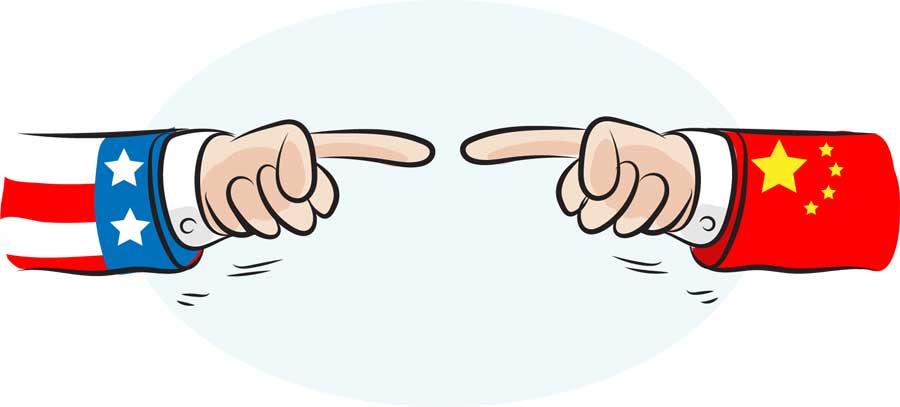14 Jul 2021 - {{hitsCtrl.values.hits}}

Relations between the world’s two strongest powers; US and China - have reached a dangerously new low. Both nations are presently indulging in sabre rattling and use of bellicose and threatening language.
Relationships between the two powers deteriorated in 2020. Earlier, soon after Trump’s election to the US presidency, he (Trump) enjoyed a good relationship with the Chinese President Xi, praising Xi as “a great gentlemen”, referring to him as the most powerful [Chinese] President in a hundred years and praising Xi’s treatment, when he visited China.
In the 2020s, a number of events converged, first China’s rapid development as an economic power house, a technology giant and military power was challenging worldwide US leadership. The second was the spread of Covid-19 pandemic, which Washington blamed on China and continues to devastate the US.
While China was able to control the spread of the disease, the US under Trump seemed helpless against its ravages. In turn it led to an aggravation of already deteriorating relations worsened by US trade embargo on Chinese made products leading to the trade war between the two powerhouses.
The third was the looming presidential elections in the US in November that year. In an effort to assert his position as the dominant world power, US battleships began ever increasingly patrolling the South China Sea claiming ‘freedom of navigation.’
Over the past few months, US frigates have begun intruding into waters claimed by China. Just yesterday (July 12), China announced that its navy had driven out an American warship from Chinese waters.
In a statement on July 12, the Southern Theater Command of the People’s Liberation Army said it had dealt with an American warship, the ‘USS Benfold’, which had entered the waters around the Paracel Islands without China’s approval.
Issuing its own statement, the US Navy said that its “innocent passage” through the islands was a challenge to the unlawful restrictions put upon the area by China, Vietnam and Taiwan. “By conducting this operation, the US demonstrated that these waters are beyond what China can lawfully claim as its territorial sea.”
On the same day, US Secretary of State, Anthony Bliken warned China of America’s determination to defend the Philippines’ armed forces from an armed attack by China. The US could, Blinken announced invoke a 70-year-old Defence Pact in the event the Chinese military action against the Philippines’ assets.
To the Chinese, it immediately brings to mind echoes of colonial era gunboat diplomacy, tactics used by the western powers during the ‘Opium Wars’ to open China up to the opium trade. Opium was first introduced to China by the Turks and Islamic traders as medicinal drugs.
The Opium Wars arose from China’s attempts to suppress Britain’s opium trade within China. The British had been illegally exporting opium mainly from India to China since the 18th century, but that trade grew dramatically. To stop widespread addiction, the Chinese government confiscated and destroyed more than 20,000 chests of opium —some 1,400 tons — that were warehoused at Canton by the British.
Hostilities broke out later that year, leading to the China’s defeat and being forced to accept the opium trade, accepting unequal treaties and the ceding of Hong Kong to the British.
Today, US-China military incidents are continuing to occur. With bilateral trade relationships between the two powers continuing to deteriorate - like the threat of new US sanctions on Chinese products - relationships will worsen and future military encounters will only grow more dangerous.
The new US regime appears to be on a path of confronting China in its own backyard to show its determination to deter that country. But such tactics could easily escalate into deadly clashes.
The world can only hope that saner counsel will prevail and such adventurous gamesmanship be avoided.
26 Apr 2024 5 hours ago
26 Apr 2024 5 hours ago
25 Apr 2024 7 hours ago
25 Apr 2024 8 hours ago
25 Apr 2024 8 hours ago